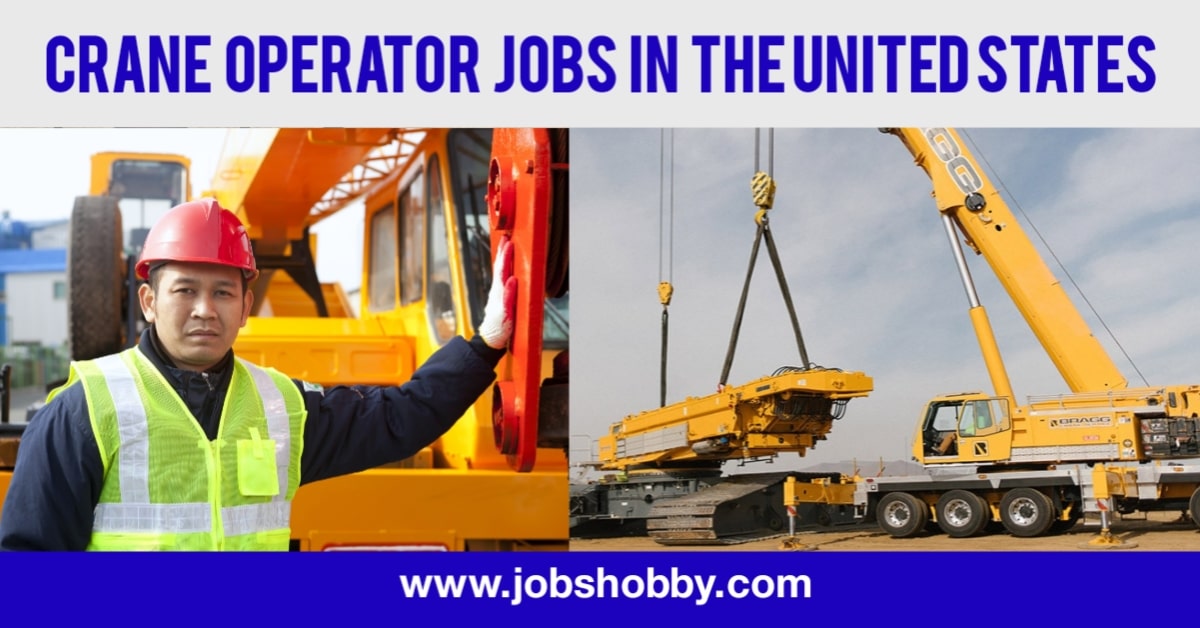In the United States, the construction industry is still doing well, so there is a constant demand for skilled crane operators. Crane operators’ importance has increased more than ever as a result of the expansion of various industries like residential construction, infrastructure development, and industrial projects. Finding the most recent crane operator jobs in the United States can provide you with a wealth of opportunities, regardless of whether you are an experienced professional or a novice in the field. In this article, we will look at the current job market, the qualifications that are required, and where to find these lucrative positions.

The Growing Demand for Crane Operators
Table of Contents
Public and private investments are driving a boom in the construction industry in the United States. Cranes are now an essential part of the landscape, appearing everywhere from skyscrapers in bustling cities to extensive infrastructure projects in rural areas. As construction activity has increased, there has been an increase in the need for skilled crane operators who are able to manage these massive machines safely and effectively. The Bureau of Labor Statistics (BLS) projects steady employment growth for crane operators over the next ten years. In states like Texas, California, and Florida, where there are a lot of job openings as of 2023, there will be thousands of them. These states are experiencing rapid urbanization and infrastructure growth, making them a hotbed for jobs as crane operators.
Qualifications and Certifications for Crane Operators
Having the appropriate qualifications and certifications is essential if you want to take advantage of the rising demand for crane operators. The National Commission for the Certification of Crane Operators (NCCCO) or another organization that is comparable is required to provide certification for crane operators in the United States. This certification guarantees that operators have the knowledge and abilities necessary to safely operate cranes.
Basic Requirements
- Age: Crane operators must be at least 18 years old, according to most employers.
- Education: Typically, a high school diploma, or GED, is required.
- Training: It is essential to complete a recognized training program for crane operators.
- Physical Fitness: Because the job requires long hours of concentration and the ability to operate heavy machinery, operators must be physically fit.
NCCCO Certification
The industry’s standard is the NCCCO certification. An operator’s knowledge and abilities are assessed through written and practical tests. The certification must be renewed every five years to keep operators up-to-date on the most recent safety technologies and protocols.
Where to Find the Latest Crane Operator Jobs
Numerous platforms and resources can assist you in finding the most recent job openings in the United States because of the rising demand for crane operators. The most trustworthy sources are as follows:
Online Job Portals
- Indeed, thousands of national jobs for crane operators are listed on one of the largest job search engines. Jobs can be filtered by salary, location, and level of experience.
- Glassdoor: You can learn more about potential employers by reading company reviews and job listings on Glassdoor.
- ZipRecruiter: ZipRecruiter has a lot of crane operator jobs, from entry-level to experienced positions, and it is known for its easy-to-use interface.
Industry-Specific Websites
- CraneNetwork.com: This platform connects crane operators with industrial and construction employers. It focuses on jobs that involve cranes.
- ConstructionJobs.com: This site, which focuses on the construction sector, is an excellent resource for finding positions as crane operators.
Union Websites
Websites like those of the International Union of Operating Engineers (IUOE) frequently list job openings that are only open to union members. Most of the time, these jobs come with competitive pay and benefits.
Local Job Fairs and Networking Events
Networking at industry-specific and local job fairs can also be helpful ways to meet potential employers. These events are well worth your time because many businesses prefer to hire candidates they have met in person.
Salaries and Benefits for Crane Operators
The specialized skills of crane operators are compensated well. The Bureau of Labor Statistics (BLS) reports that crane operators in the United States earn an average of $60,000 per year. However, factors like location, experience, and the kind of crane used can significantly affect this figure.
Factors Influencing Salary
- Location: Operators typically earn higher salaries in states with a lot of construction activity, like California and New York.
- Experience: Seasoned operators with years of experience may be able to obtain more prestigious projects and command higher wages.
- Type of Crane: Due to the increased skill required, operating more complex cranes, such as tower cranes, often comes with higher pay.
Benefits
Numerous crane operators benefit from health insurance, retirement plans, and paid leave in addition to competitive salaries. Operators who are members of a union frequently enjoy additional benefits like job security and opportunities for additional training.

Future Trends in Crane Operator Jobs
Crane operators in the United States appear to have a bright future ahead of them. The job market is expected to be influenced in the coming years by the following trends:
Technological Advancements
The crane industry is likely to undergo a revolution as a result of the incorporation of technology into crane operations. There will be a lot of demand for operators who are good with remote controls and computerized systems. To remain relevant in this ever-evolving field, continuous learning and adaptation to new technologies will be essential.
Sustainability and Green Construction
Crane operators will need to be familiar with eco-friendly materials and methods as the construction industry moves toward more sustainable practices. New types of cranes designed specifically for green construction projects may emerge as a result of this shift.
Increased Safety Regulations
Safety regulations for crane operations are likely to rise as a result of the construction industry’s emphasis on safety. To avoid accidents and legal issues, operators will need to keep up with the most recent safety protocols and ensure that they are followed.
Conclusion
Due to the numerous job opportunities provided by the expanding construction industry, crane operators play an increasingly important role in the United States. You can secure a rewarding career as a crane operator by acquiring the necessary qualifications, staying current with industry trends, and utilizing the appropriate resources. The prospects for those working in this vital field are bright, whether you are just starting out or looking to advance your career.
